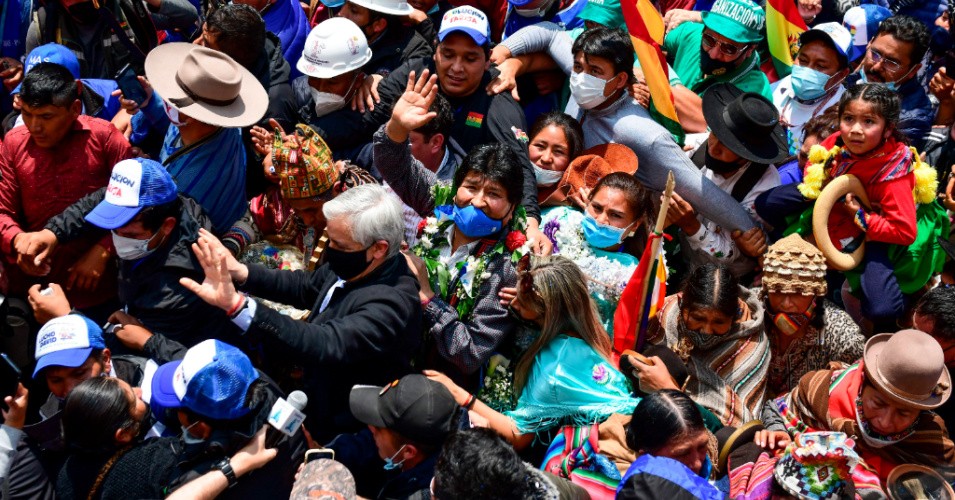Former President Evo Morales Returns to Bolivia One Year after Being Forced into Exile by Military Coup
LATIN AMERICA AND THE CARIBBEAN, 23 Nov 2020
Kenny Stancil | Common Dreams - TRANSCEND Media Service
9 Nov 2020 – Twelve months after being driven into exile by right-wing forces, socialist former president Evo Morales was “received by the very social movements who defeated the coup and restored democracy.”

Bolivia’s former president Evo Morales waves in Villazón, Bolivia on November 9, 2020 upon returning to his country from exile in Argentina, where he had sought refuge after a right-wing coup one year ago. (Photo: Ronaldo Schemidt/AFP via Getty Images)
Evo Morales was welcomed back to Bolivia today surrounded by the thunderous cheers of thousands of supporters who took part in a joyous celebration filled with music.
Morales’ return comes one year after the former president of the Latin American country was forced into exile by a violent far-right regime that was installed via a military coup, which was facilitated by unsubstantiated claims of electoral fraud made by the U.S.-dominated Organization of American States (OAS) and condoned by corporate media outlets.
It also comes one day after Bolivian President Luis Arce, Morales’ ally in the Movement for Socialism (MAS) party, was inaugurated following his election last month, considered a repudiation of authoritarianism and imperialism.
Massive crowds gathered in Villazón, a southern town that borders La Quiaca, Argentina, to greet Morales upon his return to Bolivia from the neighboring country, where the popular leftist leader had spent most of the past twelve months as a political refugee.
“Today is an important day in my life. Returning to my homeland, which I love so much, fills me with joy,” Morales tweeted early Monday morning, prior to crossing the border with Argentinian President Alberto Fernández.
Morales was not the only person who was ecstatic about his homecoming. Journalist Ollie Vargas shared a video on social media of Bolivians dancing in Villazón on Sunday night in anticipation of Morales’ return.
In Villazón, Bolivia, people are bursting with excitment for the return of Evo Morales tomorrow. He'll be crossing the border on foot into this town on the Bolivian side.
"We're back in power, now theres millions more of us, even more than the first time" pic.twitter.com/sMuVeAb4GS
— Ollie Vargas (@OllieVargas79) November 8, 2020
On Monday morning, thousands of Bolivians gathered to welcome Morales back to the country.
#InPictures | Thousands of Bolivian citizens gather to welcome former President Evo Morales @evoespueblo. #BoliviaRecuperaSuDemocracia pic.twitter.com/ChjJroytTP
— teleSUR English (@telesurenglish) November 9, 2020
Moments before Morales’ return, Camila Escalante, a reporter with teleSUR English, called it a “historic day for the people of Bolivia and our continent.” Morales, she noted, will “be received by the very social movements who defeated the coup and restored democracy.”
https://twitter.com/camilateleSUR/status/1325793935772545026?ref_src=twsrc%5Etfw%7Ctwcamp%5Etweetembed%7Ctwterm%5E1325793935772545026%7Ctwgr%5E&ref_url=https%3A%2F%2Fwww.commondreams.org%2Fnews%2F2020%2F11%2F09%2Fhistoric-day-jubilation-evo-morales-returns-bolivia-one-year-after-military-coup
Kawsachun News captured the scene as Morales crossed the border.
https://twitter.com/KawsachunNews/status/1325805580221632512?ref_src=twsrc%5Etfw%7Ctwcamp%5Etweetembed%7Ctwterm%5E1325805580221632512%7Ctwgr%5E&ref_url=https%3A%2F%2Fwww.commondreams.org%2Fnews%2F2020%2F11%2F09%2Fhistoric-day-jubilation-evo-morales-returns-bolivia-one-year-after-military-coup
“I am very grateful to the Bolivian people for receiving me with such affection,” Morales tweeted soon after his return.
Estoy muy agradecido con el pueblo boliviano por recibirme con tanto cariño. pic.twitter.com/Ba0bJYPcu7
— Evo Morales Ayma (@evoespueblo) November 9, 2020
According to teleSUR English, Morales, accompanied by Fernández, will embark on a tour of Bolivia this week and is scheduled to arrive in the city of Cochabamba on Wednesday [11 Nov].
_________________________________________________
Kenny Stancil is a staff writer for Common Dreams.
Our work is licensed under a Creative Commons Attribution-Share Alike 3.0 License. Feel free to republish and share widely.
Tags: Bolivia, Bolivian Coup, Capitalism, Conflict, Economics, Evo Morales, Geopolitics, Hegemony, Human Rights, Imperialism, Indigenous Rights, Latin America Caribbean, Lithium, Military Intervention, Neocolonialism, Politics, Power, Racism, Resources, USA, Violence
DISCLAIMER: The statements, views and opinions expressed in pieces republished here are solely those of the authors and do not necessarily represent those of TMS. In accordance with title 17 U.S.C. section 107, this material is distributed without profit to those who have expressed a prior interest in receiving the included information for research and educational purposes. TMS has no affiliation whatsoever with the originator of this article nor is TMS endorsed or sponsored by the originator. “GO TO ORIGINAL” links are provided as a convenience to our readers and allow for verification of authenticity. However, as originating pages are often updated by their originating host sites, the versions posted may not match the versions our readers view when clicking the “GO TO ORIGINAL” links. This site contains copyrighted material the use of which has not always been specifically authorized by the copyright owner. We are making such material available in our efforts to advance understanding of environmental, political, human rights, economic, democracy, scientific, and social justice issues, etc. We believe this constitutes a ‘fair use’ of any such copyrighted material as provided for in section 107 of the US Copyright Law. In accordance with Title 17 U.S.C. Section 107, the material on this site is distributed without profit to those who have expressed a prior interest in receiving the included information for research and educational purposes. For more information go to: http://www.law.cornell.edu/uscode/17/107.shtml. If you wish to use copyrighted material from this site for purposes of your own that go beyond ‘fair use’, you must obtain permission from the copyright owner.
Read more
Click here to go to the current weekly digest or pick another article:
LATIN AMERICA AND THE CARIBBEAN: